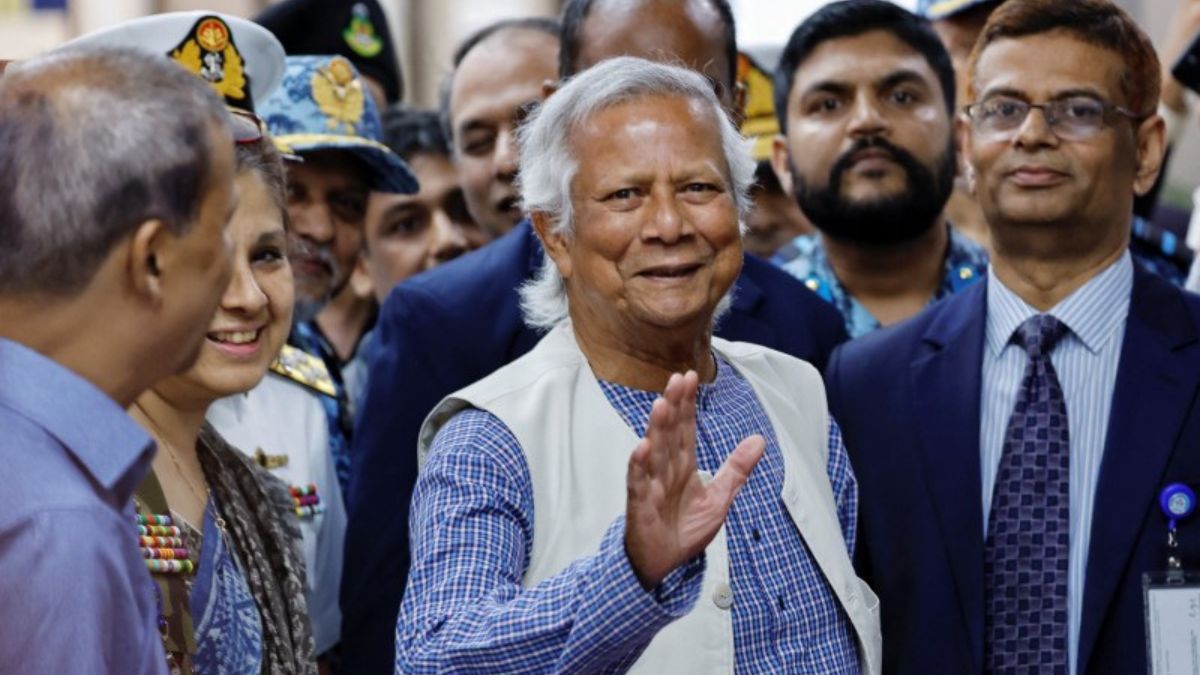Mohammed Yunus’ recent visit to the US, the first visit after being force-fit as the head of the interim government in Bangladesh, is full of optics, warm receptions, cheerfulness and high promises, and indicates the American collusion in the Bangladesh crisis. The adulations on Yunus are nothing short of a hero welcome. He has delivered what the US expected from him – to do regime change. Sheikh Hasina didn’t toe the American line. The latter wanted to get rid of her. The Islamists of Bangladesh delivered the regime change through street veto and displaying mob power.
The US is a democracy, but it allowed all undemocratic and unconstitutional means to wreak havoc in the streets of Dhaka to unseat Hasina. Her official residence was mobbed and looted. Vulgarity was permitted in the public space without any hint of modesty or restriction. Amid all this chaos, Yunus was airdropped as chief advisor of the interim government, and the US accepted this unconstitutional appointment without the consensus or collective will of the people. In May last year, Sheikh Hasina visited the US to attend the IMF and World Bank meetings but received no reception like Yunus. The contrast seen here indicates Yunus being the darling of the US. The jubilation was ironically extended to the unelected.
The US’ specialisation in regime change is a known fact. But the problem is that it has messed up everything wherever it has done the regime change. It has taken the country concerned from stability to chronic uncertainty. It is very good at regime change but paradoxically worse at conflict resolution. Examples of Vietnam, Afghanistan, the Middle East, North Africa, etc. , indicate its failure to settle the conflict after carrying out regime change. It has taken a complete U-turn for its inability to deliver its promises. Bangladesh is not going to be any different.
Now, regime change is done. Can the Islamists and their weak and pro-US leader do any better to stabilise Bangladesh’s conflict? The Islamists will never bother about the economy of Bangladesh. The garment industry is sinking. They will ensure the complete Islamisation of Bangladesh. They will concentrate their target on minorities. Bangladesh will go Myanmar’s way. The conflict economy and Western aid will run their business of radicalism. Mohammed Yunus will do the damage control with its fake promises and platitudes and allow the Islamists to do their dirty work. The ordinary people will bear the brunt of inflation, poverty and economic desiccation.
Impact Shorts
View AllProlonged instability in its immediate neighbourhood will trouble India. This is apparently the objective of the US. But can the US fight against China in the Indo-Pacific by weakening India or antagonising India? India has a great deal of depth in the Bay of Bengal geopolitics. Its deep history in the Indian Ocean marine space and civilisational connection with South East Asia cannot be ignored. A troubled relationship with India will weaken the US’ anti-China geopolitics in the Indo-Pacific. The US’ chequered history with India, especially the former’s long support of Pakistan, undergirds suspicion and caution. The US’ support of Bangladesh will make India more measured and watchful of American geopolitics in the Bay of Bengal.
The US does not seem interested in the democratic election in Bangladesh soon. It does not intend to do anything that will accelerate a free and fair election. Therefore, the election does not seem to be a priority any more. But the targeting of minorities, especially the Hindu and Buddhist minorities, and radicalism seen on the streets and their continuity and consistency will relapse Bangladesh into East Pakistan. Pakistan is doing everything to fan the flames of fundamentalism. The desecration and demolition of the statues of Bangabandhu Mujibur Rehman during the so-called student protest explain the Islamist agenda of bouncing back to the pre-Bangladesh East Pakistan avatar.
Yunus introduced two students at Clinton Global Initiative and called them the brains behind the revolution if it can be called a revolution. He flaunted them as revolutionaries. The octogenarian whitewashes their violence and legitimises them as harbingers of change. Instead of being critical of them for the atrocities on minorities, vulgarity and disrespect to a woman prime minister, desecration and destruction of the statues of Mujibur Rehman, and loot and vandalism of Hasina’s official residence, they were lauded in the US and events were organised to recognise their deeds. This indicates how low the US can go.
When the Bangladesh crisis was lauded in the US, back in Bangladesh, the Hindus were reportedly told to pay five lakhs for each pandal for Durga Puja, not to do any puja during Azan time, not to immerse the deity in water, etc. Even puja holidays are told not to be given. Idols were reportedly vandalised. The demand for five lakh rupees for each Durga Puja pandal is also construed as a jizya, a tax paid by non-Muslims to a Muslim ruler for the practice and protection of their religion. If this is not jizya, it is a religiously determined act of extortion. This is no less a crackdown on the Hindu religion.
Durga Puja was once a national festival. It was celebrated with great enthusiasm and vitality. The hatred against the Hindus was always in the form of an undercurrent. This has become more expressive now. It will continue for a longer time. If a free and fair election does happen soon, which is quite unlikely, Bangladesh will see its hard times. The US bats for democracy and human rights openly, but the plights of the Bangladeshi minorities do not come under its democratic and human rights scanner. It prefers convenience to the truth. The mobs and Islamists are at the helm of Bangladesh.
Yunus is a titular head and a paper tiger to sanitise their actions with a language acceptable to the West. Democracy, secularism and social justice advocated by the Bangladeshi constitution will not affect the Islamists. Moreover, the unelected interim government expresses its confidence in amending the constitution. It will be no less a travesty than the end of democracy in Bangladesh. Here, the US does the policy miscalculation and intends to harvest as much geostrategic and geopolitical profits from the rise of Islamism and anarchy in Bangladesh.
This is a classic case of the US’ regime change formula, followed by unending instability. It gives aid to Islamists for the persistence of chaos, fundamentalism and economic devastation. This will provide some geostrategic dividend in its aspiration to check India and choke China’s expansionism. But it will create an unending problem and leave it unsolved for India to settle and get along. This is the US’ conventional Machiavellianism. It pampers the Islamists to achieve its malicious objectives.
Dr. Jajati K Pattnaik is an Associate Professor at the Centre for West Asian Studies, School of International Studies, Jawaharlal Nehru University, New Delhi. Dr. Chandan Panda is an Assistant Professor at Rajiv Gandhi University (A Central University), Itanagar.


)
)
)
)
)
)
)
)
)



